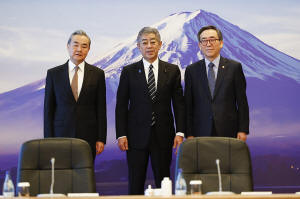Japan, China and South Korea discuss trilateral cooperation
[March 22, 2025] By
MARI YAMAGUCHI
TOKYO (AP) — Foreign ministers from Japan, China and South Korea
reaffirmed the importance of denuclearization on the Korean peninsula
and sought trilateral cooperation on common ground in areas like aging,
low birth rates, natural disasters and cultural exchange at a meeting
that took place at a time of growing tensions.
At a joint news conference after the talks, Japanese Foreign Minister
Takeshi Iwaya said he, his Chinese counterpart Wang Yi and South Korea’s
Cho Tae-yul agreed on the need to promote mutual understanding and
trust, while tackling shared and multi-generational concerns to gain
wider support for trilateral cooperation.
Iwaya emphasized his concerns about North Korea' s nuclear and missile
development and cooperation with Russia as regional threats, and
stressed the importance of pursuing the North's full denuclearization
under the U.N. Security Council resolutions.
Iwaya reiterated Japan's condemnation of Russia's war on Ukraine, adding
that there is no place in the world for unilateral attempts to change
the status quo by force, a subtle message about China's growing
assertiveness in the region.

Wang said that China supports the formation of a mutual regional economy
and proposed further efforts toward resuming talks on an economic
framework for the three countries and promoting an expansion of the
15-nation Regional Comprehensive Economic Partnership, or RCEP.
Wang said trilateral cooperation in a range of areas including
technology, climate exchange and other issues will “serve as key driving
force for East Asian cooperation.”
The meeting on Saturday focuses on plans for a trilateral leaders'
summit later this year amid growing political and economic uncertainty
at home and challenges from U.S. President Donald Trump.
The three-way meetings are an accomplishment for Japan, which has
historical and territorial disputes with both China and South Korea.
Iwaya said he hoped to accelerate efforts toward achieving a leaders'
summit in Japan later this year. An earlier trilateral meeting was held
in South Korea last year.

[to top of second column] |

Chinese Foreign Minister Wang Yi, left, Japanese Foreign Minister
Takeshi Iwaya, center, and South Korean Foreign Minister Cho Tae-yul
pose for a photo during their trilateral foreign ministers' meeting
in Tokyo Saturday, March 22, 2025.(Rodrigo Reyes Marin/Pool Photo
via AP)
 Cho, whose country chaired their
leaders’ first summit after a four-and-half-year hiatus due to the
pandemic, said the ongoing global crisis makes trilateral
cooperation more important than ever.
Later Saturday, delegations from Japan and China met separately to
hold their first high-level economic dialogue since April 2019,
attended by dozens of officials from economy, transportation,
environment, health and labor as well as the finance ministries.
In his opening remarks, Wang said expanding cooperation into new
areas and strengthening of communication are key to promoting
comprehensive and mutually strategic relations between the two
countries.
But he said that there is a long way for the recovery of the global
economy, and noted that the global economy is facing serious
changes, as unilateralism and protectionism has accelerated and
politicizing of science and technology, as well as expansion of
national security have become rampant.
Discussions at the economic dialogue were to include China's ban on
Japanese seafood imports since the start in August 2023 of
discharges of treated radioactive wastewater into the sea from the
tsunami-hit Fukushima Daiichi nuclear power plant.
Iwaya and Wang also held separate bilateral talks with Cho.
U.S. allies Japan and South Korea have rapidly improved ties, as
they share mutual concerns over China’s growing threat in the
region.
Tokyo and Beijing agreed in December to improve ties in spite of
their differences, including disputes over a group of uninhabited
islands that both claim, as well as China’s territorial disputes
with other countries in the South China Sea.
All contents © copyright 2025 Associated Press. All rights reserved |